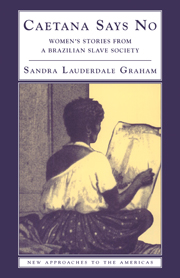Book contents
Inácia Wills Her Way: Patriarchy Confirmed
Published online by Cambridge University Press: 05 February 2015
Summary
In 1857 an old woman made generous provisions for a family of slaves. This story tells of the inescapably human consequences that followed from her carefully worded instructions, and how her intentions collided with one man's sense of order.
The year before she died, Inácia Delfina Werneck, being eighty-six years old and “somewhat ill but getting about and in perfectly sound mind,” prepared her last will and testament. A will is first of all a legal document that disposes of and distributes property. For the historian who wants to recover the shape and sense of past lives, it is also a usefully complex cultural document revealing how people, who could not or did not otherwise write about their lives, chose to present themselves in relationship to their God, death, their families, and their goods. Nineteenth-century Brazilians were more often illiterate than literate, but even those with the skills to read and write did not frequently write, or at least not keep, bundles of personal letters or diaries, although of course some occasionally did both. The culture, not being literary, is better characterized as juridical. Brazilians authenticated myriad transactions – all contracts and transfers of property, including wills – through a notary, who in turn faithfully recorded them in large books that by law were preserved for future consultation. Anyone with reputation, property, or personal well-being to protect – and that included just about everybody – might find reason to take matters to the courts.
- Type
- Chapter
- Information
- Caetana Says NoWomen's Stories from a Brazilian Slave Society, pp. 83 - 158Publisher: Cambridge University PressPrint publication year: 2002



